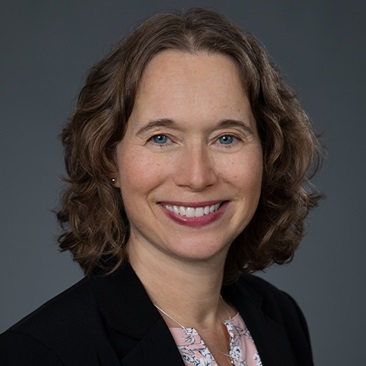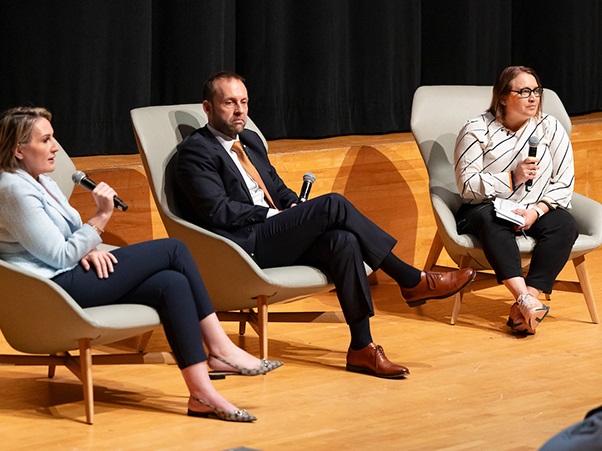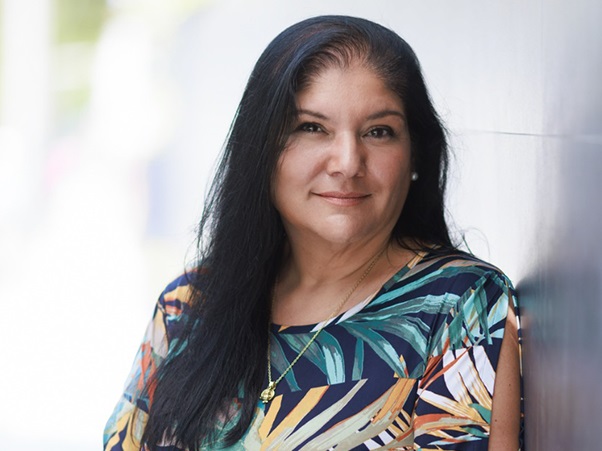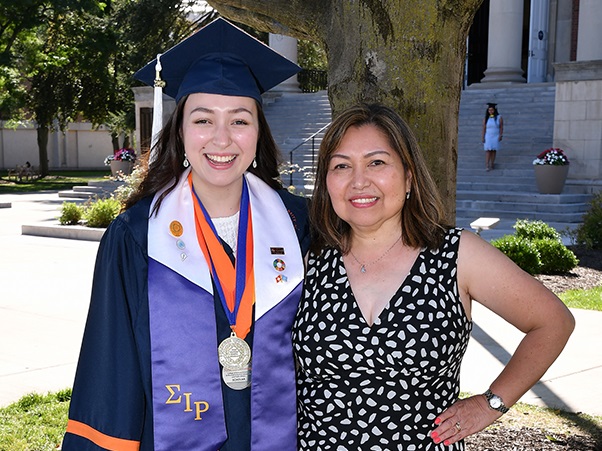Maxwell Scholars Examine ‘Always Fragile’ Democracy
December 11, 2024
Amid reports of democracy’s global decline, Maxwell faculty and students are gathering new insights into perception, polarization and other pressing concerns.
On a Friday afternoon in November, a group of researchers gathered around a table in the Program for the Advancement of Research on Conflict and Collaboration (PARCC) to talk about the logistics of surveying individuals around the world about their views on democracy.

Faculty members Tina Nabatchi and Catherine Herrold and three graduate students from the Public Administration and International Affairs Department had been holding the weekly meetings in the Maxwell-based institute for their Frontlines of Democracy project, which is supported by a grant from the crowdfunding organization Participedia.
They shared ideas for survey questions and puzzled over which communication platforms to use, considering the wide-ranging international audience.
In a packed Maxwell Auditorium later the same day, a panel of political scientists took the stage to dissect the results of the U.S. presidential election.
The State of Democracy lecture hosted by the Campbell Public Affairs Institute offered critical analysis of factors that influenced the race, spanning topics such as the economy, political strategy, gender and race.
In his opening remarks, Campbell Director and Hicker Family Professor of Restoring Democratic Community Christopher Faricy told the audience: “These are indeed polarized and perilous times, and this polarization is exacerbated by how we get information about politics and policy.”
Faricy said the panel’s civil dialogue and dissection of the election would reflect the conversations that are routinely “had in the halls of Maxwell and in our classrooms.”
Indeed, the study of democracy has been a hallmark of the Maxwell School since its founding 100 years ago. It spans public affairs and the social sciences, now including disciplines like sociology and geography that study it in relation to topics such as public health and access to food.
‘We Don’t Vote for the Justices’
The state of American polarization, paired with recent reports by democracy watchers around the world, brings urgency to the work underway at Maxwell.
The International Institute for Democracy and Electoral Assistance (International IDEA) said in its recent annual report that democracy globally experienced its worst year in nearly five decades with sharp declines in free elections, parliamentary oversight and voter participation.
Likewise, the Swedish-based Varieties of Democracy (V-Dem) Institute reported that almost all aspects of democracy are getting worse in more countries than they are getting better, with freedom of expression and clean elections the most affected. Clean elections are those that are free and fair without registration fraud, systematic irregularities, government intimidation, vote buying or violence.
“Americans for a long time were kind of blissfully unaware of the fragility of democracy, but democracy is always fragile.”
Matthew R. Cleary
associate professor of political science
Thomas M. Keck, professor of political science and Michael O. Sawyer Chair of Constitutional Law and Politics, follows data shared by V-Dem. A leading expert on free speech and the U.S. Supreme Court, he is especially interested in its findings related to freedom of expression. It found that freedom of citizens to discuss political issues, academic and cultural expression, and media has come under attack in more countries than any other aspect of democracy in the past 10 years.
Supported with a Guggenheim Fellowship, Keck is on a research leave to study judicial decisions related to free speech in backsliding democracies around the world. He plans to share his findings in a forthcoming book, tentatively titled “Free Speech and Democratic Backsliding.”
“Under conditions of democratic backsliding, freedom of expression gets threatened in two ways,” he said. “First, autocratic leaders come to power intolerant of dissent and crack down on opposition. Second, pro-democratic actors trying to shore up and defend their democracies also regularly try to enact and enforce new restrictions on speech.”
The latter sometimes involves well-intended lawmakers seeking to curtail disinformation or other harmful rhetoric that could incite violence or promote election subversion. Therein lies a debate well-situated for classroom examination: In these uncharted times, should free speech face greater restrictions for the protection of other foundations of U.S. democracy?
Similarly complex are the calls for U.S. Supreme Court reform such as term limits or expansion. Currently, six of the nine justices are conservative and have been appointed by Republican presidents, despite Democratic presidents serving 12 of the last 16 years. Keck said the high court was similarly stacked during President Roosevelt’s New Deal era: Five conservative justices struck down significant acts of Congress and thwarted his efforts at industrial reform until they were faced with the threat of adding as many as six new justices.
On the current U.S. court, Keck worries that backsliding may result from recent decisions including a refusal to limit gerrymandering and diminishing key provisions of the 1965 Voting Act, which increased African American participation in the South.
“The effect is contributing to the downward erosion of U.S. democratic health,” he said. “When the court does it, it’s hard to respond—we don’t vote for the justices.”

Another research project in the works at Maxwell, by Keck’s political science colleague Johanna Dunaway, relates to a different threat to democracy identified by the International IDEA and V-Dem: polarization.
Dunaway is professor of political science and research director of the Washington, D.C.-based Syracuse University Institute for Democracy, Journalism and Citizenship. She received a prestigious Carnegie Fellowship earlier this year to advance her study of affective polarization.
Affective polarization describes the phenomenon in which an individual’s feelings toward members of their own political party or group become more positive, while their feelings toward members of the opposing party or group become more negative. It often leads to increased hostility and a lack of willingness to work together, explained Dunaway, who is also looking at how changing media environments are linked to anti-democratic behaviors.
“Polarized people are way more susceptible to mis- and disinformation from partisans on their own side,” she said, adding that a polarized society also faces greater threat of foreign interference.
In 2018 Dunaway was among a trio of researchers who looked at voting patterns in communities of shuttered newspapers. Their work caught the attention of a Florida daily newspaper, resulting in its decision to take a break from publishing national politics on its editorial pages. The aftermath of the paper’s decision created additional data, which resulted in Dunaway’s co-authored book, “Home Style Opinion: How Local Newspapers Can Slow Polarization” (Cambridge University Press, 2021).
Joining the Fight
The Frontlines of Democracy project is one of several wide-ranging endeavors involving students looking to gain new insights on the state of democracy, including backsliding and perceptions.
Through their survey, the Program for the Advancement of Research on Conflict and Collaboration (PARCC) research team hopes to answer questions such as “What do frontline actors believe are the most important considerations for the future of democracy?” and “What do they see as the greatest opportunities—and biggest threats—for their work?”
They define frontline actors broadly, including religious and community leaders, civil society members, artists, activists, educators, technology innovators, and others who fight to promote or protect democracy.
“We hope to pivot the conversation about democracy’s future away from handwringing and toward identifying, developing and expanding creative paths toward a prosperous global democracy,” said Tina Nabatchi, Joseph A. Strasser Endowed Professor in Public Administration and director of PARCC. “We also intend to create a forum through which the people on the frontlines of democracy can collaborate, and we hope to inform the efforts of funders who provide both financial and technical support to democracy brokers around the world.”
She and Catherine Herrold, associate professor of public administration and international affairs and senior researcher with PARCC, are joined by graduate students Sophie Clinton ’24 B.A. (PSc), Jonathan Garcia and Thuba Nkiwane. Clinton and Garcia are in the master of public administration program while Nkiwane is pursuing a master of arts in international relations.
“A lot of people I grew up with never had the resources or access to participate,” said Garcia, a first-generation U.S. citizen who was raised in a predominantly undocumented Hispanic community near Washington, D.C. “How can we foster democratic values within communities that are marginalized and often erased from narratives of typical democracies—such as voting and participation in elections? To me, democracy goes far beyond that; my definition broadens it to be as inclusive as possible.”
Nkiwane was born and raised under authoritarian rule in Zimbabwe. Her family belongs to a tribal community that was targeted by political elites. She was a high schooler during an especially volatile election that led to widespread riots.

“I remember tear gas thrown into my school and having teachers trying to get us to the basement to keep us safe,” she said, adding that she saw fighting and burning vehicles in the streets during that time. “Having experienced living in an authoritarian regime with people fighting for democracy, literally, and living through that, has propelled me to get into the fight myself.”
Clinton grew up near Syrcause University and draws inspiration from her deep interest in political science and democracy, and from her past experiences, including work with the Ahmad and Elizabeth El-Hindi Center for Dialogue & Action (CDA) at the Syracuse-based Interfaith Works. The CDA seeks to bring together disparate groups of people to foster mutual understanding and trust, similar to work underway at PARCC.
“That was a really important part of how I perceived and learned about the world,” said Clinton of the experience, which involved engaging with local high school students from diverse backgrounds. Of the current PARCC project, she said, “It has been really fascinating to come into this project with a U.S.-centric background and body of knowledge and to be able to sit back and learn and challenge how I perceive the world.”
Still other projects involving Maxwell students are underway in the Institute for Democracy, Journalism and Citizenship in Washington, D.C. In the lead up to the U.S. presidential election, for example, they embarked on research initiatives aimed at gathering citizens’ top concerns and views of democracy.
One project, The Deciders Focus Groups, convened monthly discussions with key voting blocs in battleground states; it was launched in partnership with polling and communications companies Engagious and Sago in collaboration with NBC News.
Another project, ElectionGraph, sought to illuminate hidden trends and actors spreading and influencing inaccurate information targeting U.S. voters through social media. A third, the American Identity Poll, measured U.S. attitudes toward democracy, news and information, and civic engagement.
‘Blissfully Unaware’
Students in the interdisciplinary undergraduate MAX course, Global Community, are assigned an article selected by Prema Kurien, professor of sociology and Daicoff Faculty Scholar, that chronicles how Hindu nationalists used the platform X (formerly Twitter) to expand their following in India, which has been identified by V-Dem as a rising autocracy.
In follow-up discussions, students in the team-taught course share how easily they relate the social media campaign to what they have experienced on their own digital networks, said Matthew R. Cleary, one of the instructors.
“Americans for a long time were kind of blissfully unaware of the fragility of democracy, but democracy is always fragile,” he said.
However, Cleary takes a pragmatic, long view. “I do think it’s pretty clear that globally speaking democracy is in a little bit of a decline,” he said, but added, “It doesn’t worry me in the sense that nothing is ever permanent, and there are always ebbs and flows.”
Cleary, associate professor of political science, studies Latin American politics and democratic theory. He said the gradual erosion of democratic institutions by way of disinformation, polarizing social media algorithms and executive aggrandizement have largely replaced the swift military coups of prior decades.
He co-authored an article in the journal Perspectives on Politics that details how in recent decades, national leaders like Turkey’s Recep Tayyip Erdoğan and Venezuela’s Hugo Chávez gained power through democratic institutions, only to undermine those institutions once in office as part of a broader effort to consolidate authoritarian power.
“It’s not clear that presidents who do these things are trying to undermine democracy as their direct goal,” said Cleary. “They are often pursuing policy changes or other goals, and in some cases, they perceive themselves to be in a weak position—Latin American presidents often get impeached.”
In class discussions, Cleary said he challenges his students to “get off social media,” consider differing perspectives and avoid making assumptions about the motives of those with whom they disagree.
Paraphrasing a famous speech by the late U.S. President Ronald Reagan, he imparts the message: “Democracy is never more than a generation away from potentially falling apart. It doesn’t matter how committed you and I are to democracy, eventually the next generation is going to take over, and they have to be committed to democracy, too.”
Faculty colleague Catherine Herrold also examines democracy outside the U.S., though from a different lens. She brings her expertise on participatory democracy to PARCC’s Frontlines of Democracy project, as she studies the ways citizens cultivate democratic citizenship regardless of the system of government under which they live.

Herrold spent five years in Egypt and Palestine following the 2011 Arab Spring uprisings and amassed countless examples of citizens coming together to bring about change, even after their attempts to form institutional democracy failed.
Her award-winning book based on this experience, “Delta Democracy: Pathways to Incremental Civic Revolution in Egypt and Beyond” (Oxford University Press, 2020), uncovers how Egyptian non-governmental organizations understand the concept of democracy and how they struggle through political authoritarianism to promote it in locally resonant and politically smart ways. The book also offers recommendations for U.S. policymakers to restructure foreign aid to better help local community organizations fighting to expand democracy.
Herrold has two more books in progress that will share her findings in Palestine and Serbia, and she was recently awarded a Fulbright Hays Faculty Research Abroad Fellowship to expand her research on citizen-led development projects in Serbia in 2025.
“I see optimism and hope everywhere, including in the U.S.,” said Herrold. “Young people are working across borders for the values of political freedom, social justice and equality of economic opportunity on which democratic institutions rest, in creative and compelling ways.”
By Jessica Youngman
Published in the Fall 2024 issue of the Maxwell Perspective
Related News
Commentary

Apr 5, 2025
Research

Apr 4, 2025
Commentary

Apr 4, 2025
Commentary

Apr 3, 2025


